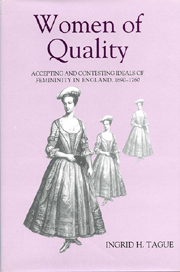Book contents
3 - Marriage
Published online by Cambridge University Press: 12 September 2012
Summary
To speak plainly, I am very sorry for the forlorn state of Matrimony, which is as much ridicul'd by our Young Ladys as it us'd to be by young fellows; in short, both Sexes have found the Inconveniencys of it, and the Apellation of Rake is as genteel in a Woman as a Man of Quality.… You may Imagine we marry'd Women look very silly; we have nothing to excuse our selves but that twas done a great while ago and we were very young when we did it.
In this letter to her sister, Lady Mary Wortley Montagu expresses what was, in the early eighteenth century, a commonplace view of wedlock. Marriage, she writes, is such an object of mockery that even women have lost interest in it, and married women like herself must “excuse” themselves for their unfashionable behavior. Obviously, Lady Mary's tone is light, but, as we saw in Chapter 1, she expresses ideas that were being argued quite seriously in a variety of circles. Many of her contemporaries agreed that marriage was becoming an object of mockery, used only as a cynical means of increasing wealth. It may seem, however, that these fears and the ideals presented in didactic literature bore little relevance to the real lives of women and men, particularly those of the elite whose behavior was targeted for criticism. After all, why would women who experienced the benefits and freedoms of fashionable society pay any attention to such works?
- Type
- Chapter
- Information
- Women of QualityAccepting and Contesting Ideals of Femininity in England, 1690–1760, pp. 72 - 96Publisher: Boydell & BrewerPrint publication year: 2002



